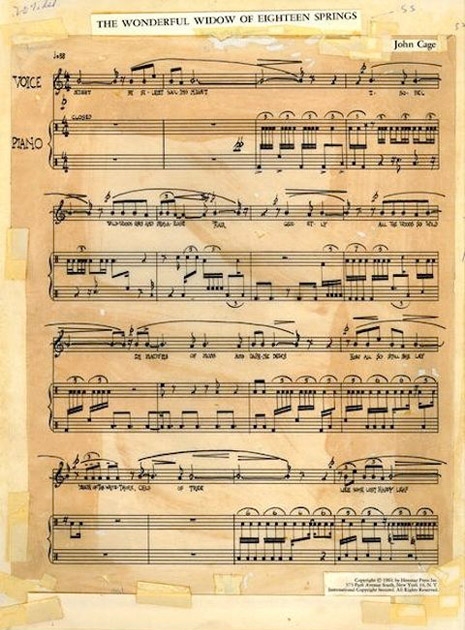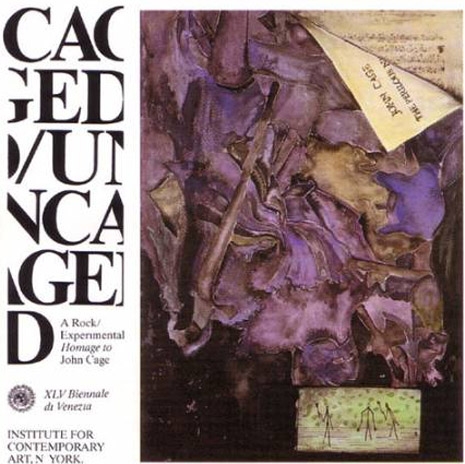
I’m far from an expert on John Cage, but of the works of his I know, I find “The Wonderful Widow of Eighteen Springs” to be among the loveliest. Since it’s short, simple to perform, and its haunting melody is easier on the listener than a lot of other 20th Century classical music, it’s one of his most oft-performed works, as well, and YouTube is full of fantastic versions. Cage composed it in 1942, limiting the vocalist to three notes and further instructing him/her to sing in a flat affect, avoiding vibrato. The musical accompaniment was written for a piano with the lid shut on its keys, the pianist directed to make percussive taps with his/her fingertips and knuckles in various places on the piano’s outside, including the bottom. This video shows that process quite clearly, and here’s what the notation looks like:

Musicologist Lauriejean Reinhardt had much to say in her illuminating essay on the history and meaning of the piece. (If this stuff doesn’t interest you and you just want to hear the Joey Ramone rendition, skip all the way to the end, no one has to know.)
Cage composed “The Wonderful Widow” in response to a commission from the soprano Janet Fairbank (1903-1947), whom he had met during his brief appointment at the Chicago Institute of Design in 1941-1942. Fairbank was an ambitious amateur singer from a wealthy family with close ties to the Chicago arts community … Endowed with modest vocal abilities, Fairbank nevertheless endeared herself to critics and advocates of modern music by her tasteful and intelligent performances and her tireless promotion of contemporary music.
Her interest in Cage proved prescient, for the Carnegie Hall recital that occasioned the setting of “The Wonderful Widow” coincided with the composer’s now-famous concert at the Museum of Modern Art, an event that placed the young Cage at the vanguard of modern music.
Evidently given free reign to prepare the song’s lyrics, Cage selected the paean to Isobel from James Joyce’s Finnegans Wake, a passage that not only gave him a theme, and some lines to lift directly, but also the piece’s title. Frankly, I find the sparseness of Cage’s interpretation a relief from the difficult density of Joyce. From Reinhardt again:
Cage’s song text, condensed and rearranged from Joyce’s original, only intensifies the lyrical dimension of the passage, for it highlights both the sylvan imagery with which the child is described (“wildwood’s eyes and primarose hair,” “like some losthappy leaf,” “like blowing flower stilled”) and a number of key alliterative phrases (“in mauves of moss and daphnedews,” “win me, woo me, wed me, ah weary me!”) that give rise to the passage’s lilting lyricism.
Compare Cage’s lyrics below to the passage from Joyce here.
night by silent sailing night,
Isobel,
wildwoods eyes and primarose hair,
quietly,
all the woods so wild
in mauves of moss and daphne dews
how all so still she lay
‘neath of the white thorn,
child of tree
like some lost happy leaf
like blowing flower stilled
as fain would she anon
for soon again ‘twill be,
win me, woo me, wed me,
ah! weary me
deeply,
now even calm lay sleeping
night,
Isobel,
Sister Isobel,
Saintette Isobel,
Madame Isa Veuve La Belle.

The 1993 compilation Caged/Uncaged - A Rock/Experimental Homage To John Cage features contributions from punk and artrock figures like Lee Ranaldo, Arto Lindsay, Debbie Harry, Lou Reed, Elliot Sharp and Ann Magnuson, and is available to hear and download for free on the wonderful UbuWeb. And on that comp, “The Wonderful Widow Of Eighteen Springs” was performed—stunningly—by Joey Ramone. The timbres of his voice are somehow perfect for this song. It may be that I find the familiarity of his singing comforting, but I think this completely dusts some (SOME) versions by trained operatic singers. It sounds like the percussion is performed here on regular drums instead of a closed piano.
I resignedly anticipate opprobrium from the purists.